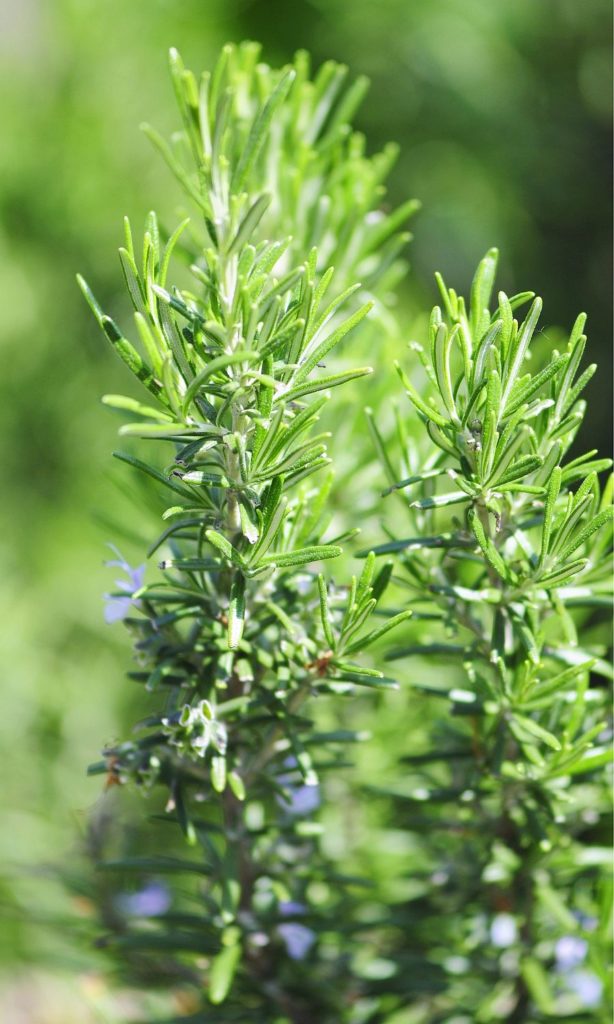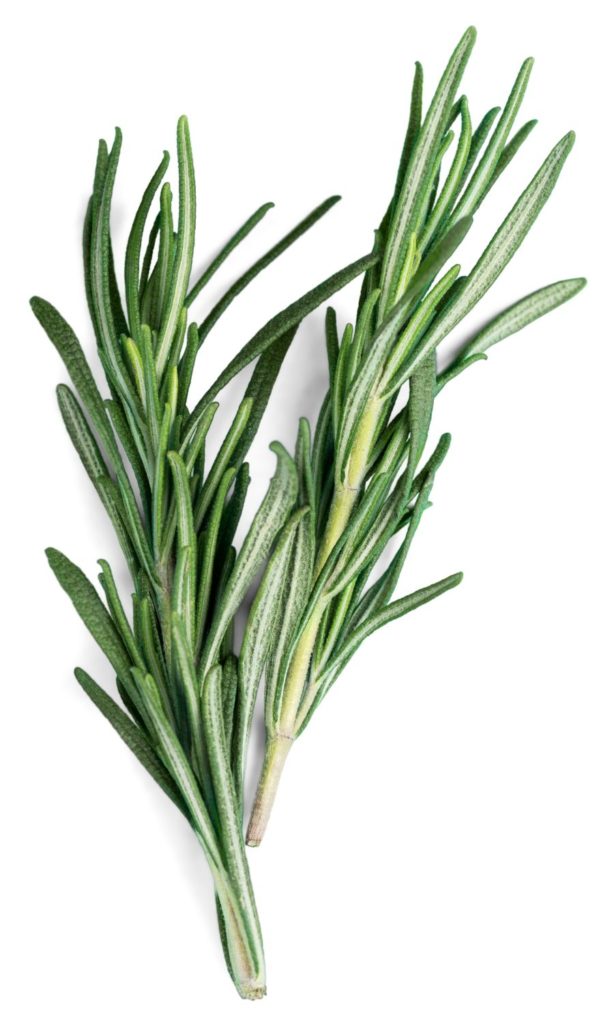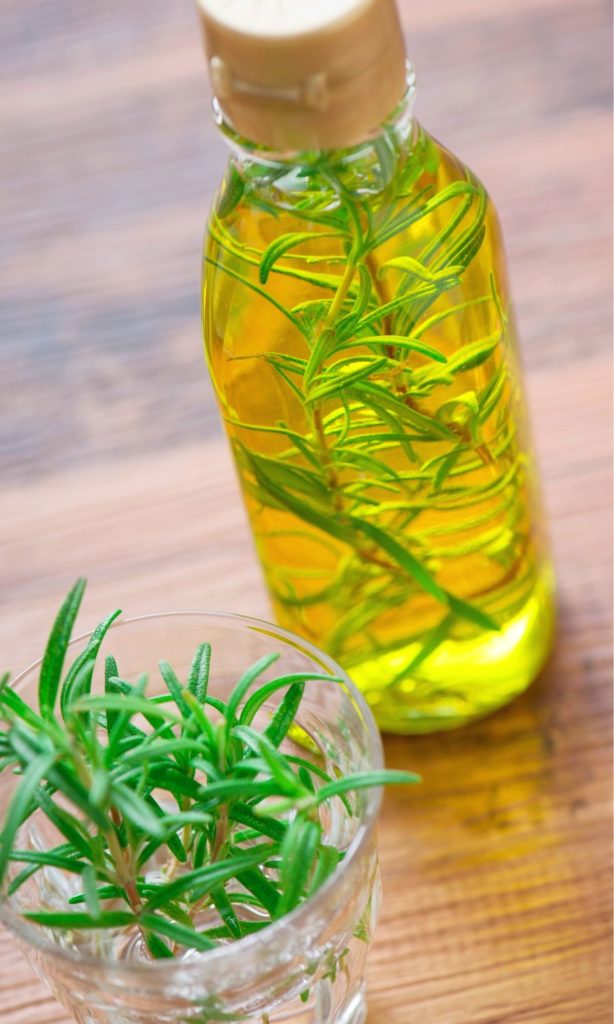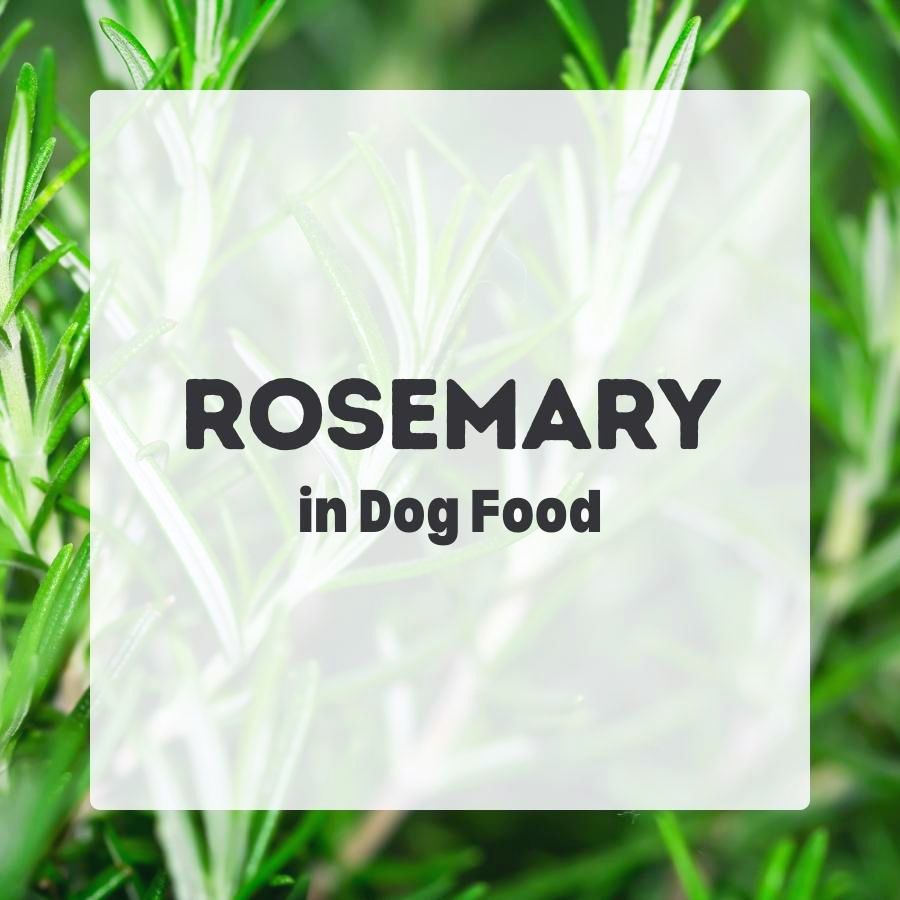Rosemary is a popular culinary herb that adds flavor to dog food. But rosemary extract in dog food is mainly used as a natural preservative, a food additive to extend shelf-life.
Contents
Rosemary in Dog Food
Did you know that the small evergreen shrub, Salvia rosmarinus, is indigenous to Mediterranean Europe?
It belongs to the Lamiaceae family and is related to many other herbs such as basil, mint, sage, oregano, thyme, or lavender.

Rosemary has been used as an aromatic herb for centuries. And it has a place in traditional folk medicine and is said to have health-promoting or hepatoprotective properties[8,9].
But as a dog food ingredient, rosemary and its related ingredients like dried rosemary powder, rosemary extract, or oil of rosemary mainly serve one of two purposes:
- As a herb ingredient to improve flavor.
- As a natural preservative to extend shelf life.
What is Rosemary Extract?
There are many bioactive compounds found in rosemary such as phenolic acids, flavonoids, diterpenoids and triterpenes which are known to be antioxidative.
Rosemary extract is mainly compromised of two of those compounds named carnosic acid and carnosol[1].
These phytochemicals have strong antioxidative and antimicrobial properties[5]!
Rosemary extract is just concentrated and purified carnosic acid/carnosol extracted from rosemary leaves to be used as an antioxidant food additive to extend shelf-life.

This food additive is extracted from ground, dried leaves of rosemary plants with acetone or ethanol. The crude extract then gets filtered, concentrated and dried into a fine beige powder.
Rosemary extract is a “natural” food additive (meaning, it contains substances found in nature). But it is nonetheless a processed dog food ingredient obtained by physical and chemical procedures.
Dried rosemary leaves contain about 2% of carnosic acid and carnosol. But rosemary extract is a very concentrated product with up to 30% carnosic acid or more.
Oftentimes, rosemary extract still contains some flavoring compounds and can be used to improve the taste of dog food.
Rosemary Extract in Dog Food
Rosemary extract is used as a natural preservative in dog food.
It’s often added via ingredients like oils, fats or rendered meals that are prone to rancidity. These ingredients get pre-treated with rosemary extract beore they even enter the food mixing bowl[3].
Rosemary extract in dog treats or food prevents oxidation and extends shelf-life of products. It’s a very common food additive widely used as a biopreservative in the (pet) food industry.
Its plant origin makes it more appealing than controversial alternatives like BHA, ethoxyquin, or BHT doesn’t it?
According to the pet food industry, typical inclusion levels rise with the fat content of the ingredient[3]:
- 200–10000 mg/kg in fish oil, vegetable oil
- 70–1000 mg/kg in animal fat
- 50–800 mg/kg in protein meals
Is Rosemary Extract Ok For Dogs?
In the US, natural extracts like rosemary extract for dogs are generally recognized as safe[4]. In the EU, rosemary extract is approved as a food additive (E 392) in pet food.
In 2022, the European Food Safety Authority (EFSA) published a scientific opinion on the safety and efficacy of rosemary extract products used in pet food[3].
There are no long-term tolerance studies in dogs. Based on limited data and rodent studies, the EFSA expert panel calculated a safe daily dose of 300 mg/kg feed for dogs[3].
But so far there is no reason for concern. Rosemary has a long history as a cultivated plant, it is unlikely to cause harm.
Still, we should don’t forget that rosemary extract ist still a food additive and would be unnecessary in a fresh diet.
Its main benefit is to be a more natural and less controversial substitute for synthetic preservatives.
There are a few circumstances where high intake of rosemary (way more than in normal food items) can cause problems:
Small amounts are ok but rosemary supplements are not recommended during pregnancy in women. So maybe it’s best to avoid rosemary for pregnant bitches, too.
Does rosemary extract cause seizures in dogs?
Rosemary does not cause seizures in healthy dogs but can make seizure disorders worse. So dogs with epilepsy and other conditions should probably avoid it, too!
Oil of Rosemary in Dog Food
Some manufacturers list “oil of rosemary” in their ingredient lists.
We could not even find a clear definition of the chemical composition of “oil of rosemary” in dog food[4].
But just like rosemary extract, the oil of rosemary is most likely used as a biopreservative and maybe for palatability.
We suspect that some manufacturers have simply adopted this term for rosemary extract or similar substances.
Rosemary does contain several volatile components like eucalyptol, camphor, borneol, verbenone, or α-pinene[6].
Some of these compounds are used to make essential oils that are known to have antioxidative as well as antimicrobial, antifungal, and antiviral effects[7].

Some of the compounds in essential oils like camphor can be toxic or irritating and should not be used on pets.
The intake level via rosemary extract is very low[3], but rosemary essential oil contains up to 20% of camphor.
Still, rosemary oils as a dog food ingredient are only used in small amounts as preservatives and are generally recognized as safe.
Further Reading
[1] World Health Organization & Joint FAO/WHO Expert Committee on Food Additives. Evaluation of certain food additives: 82nd report of the Joint FAO/WHO Expert Committee on Food Additives. WHO Technical Report Series. 2016. https://apps.who.int/iris/handle/10665/250277
[2] Mendes Maldaner Schlieck et al. Addition of a blend of essential oils (cloves, rosemary and oregano) and vitamin E to replace conventional chemical antioxidants in dog feed: effects on food quality and health of beagles. Archives of Animal Nutrition. 2021. https://doi.org/10.1080/1745039X.2021.1960091
[3] EFSA Panel on Additives, Products or Substances used in Animal Feed (FEEDAP). Safety and efficacy of two solvent extracts of rosemary (Rosmarinus officinalis L.) when used as feed additive for cats and dogs. EFSA Journal. 2022. https://doi.org/10.2903/j.efsa.2022.6978
[4] 21 CFR $182.20. Essential oils, oleoresins, and natural extractives.
[5] Birtić et al. Carnosic acid. Phytochemistry. 2015. https://doi.org/10.1016/j.phytochem.2014.12.026
[6] Milanović et al. Antioxidant activity of rosemary (Rosmarinus officinalis L.) essential oil and its hepatoprotective potential. BMC Complement Altern Med. 2014. https://doi.org/10.1186%2F1472-6882-14-225
[7] Adriana et al. New insights into antibacterial and antioxidant activities of rosemary essential oils and their main components. Food Control. 2013. https://doi.org/10.1016/j.foodcont.2012.09.022
[8] Veenstra & Johnson. Rosemary (Salvia rosmarinus): Health-promoting benefits and food preservative properties. Int J Nutr. 2021.
[9] Nieto et al. Antioxidant and Antimicrobial Properties of Rosemary (Rosmarinus officinalis, L.): A Review. Medicines (Basel). 2018. https://doi.org/10.3390%2Fmedicines5030098
[10] Raadt et al. Short Review of Extracts of Rosemary as a Food Additive. European Journal of Nutrition & Food Safety. 2015. https://doi.org/10.9734/EJNFS/2015/10404
